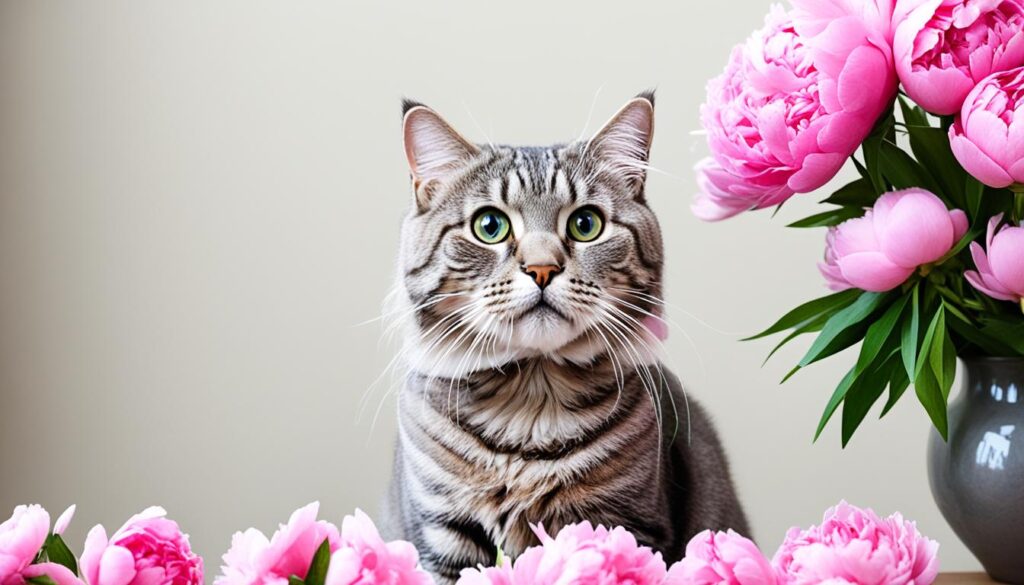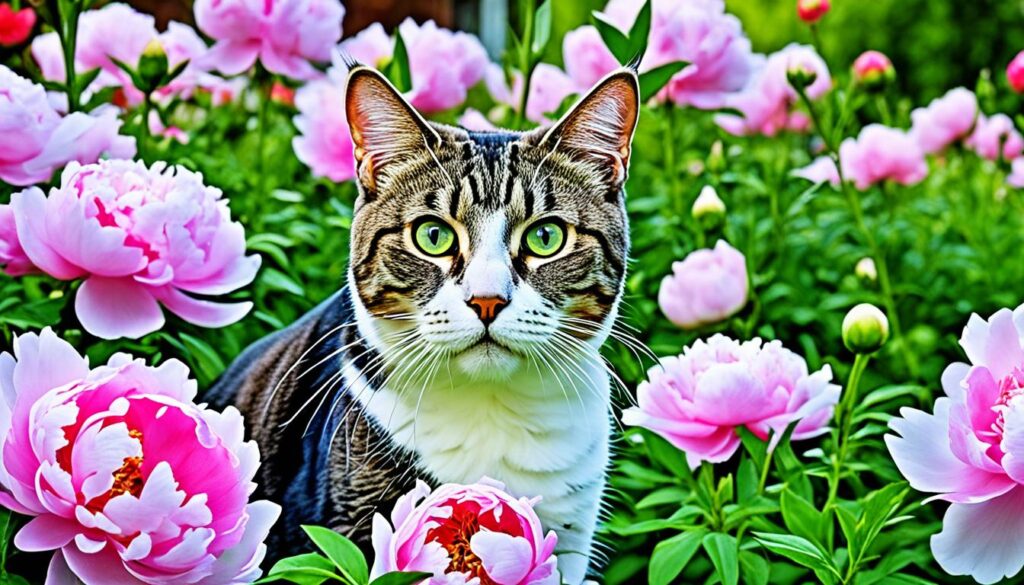Are Peonies Toxic to Cats? Pet Safety Alert
Welcome to our pet safety alert! Today, we will address an important question that many cat owners often ask: Are peonies toxic to cats? As cat lovers, we understand that your feline friend’s health and well-being are a top priority, so it’s crucial to be aware of potential dangers in your cat’s environment.
Cats are curious creatures, and they may be tempted to explore and nibble on plants around the house or in the garden. Unfortunately, peonies are indeed toxic to cats. The beautiful flowers and foliage of peony plants contain a toxin called paeonol, which can have harmful effects on your beloved pet if ingested in large amounts.
The level of toxicity depends on various factors, including the quantity consumed and the weight and health of your cat. Regardless, it’s essential to be cautious and take preventive measures to ensure the safety of your furry friend.
Key Takeaways:
- Peonies are toxic to cats due to the presence of paeonol.
- Ingesting peonies can cause gastrointestinal problems in cats.
- Closely supervise cats and prevent them from accessing peony plants.
- If you suspect peony poisoning, seek immediate veterinary attention.
- Be aware of other toxic plants and flowers that can harm your cat.
Peony Toxicity to Other Animals
While peonies are known for their beauty and fragrance, they can pose a significant danger to not only cats but also other animals. Horses, in particular, are susceptible to the toxic effects of peonies if they consume any part of the plant.
The primary culprit behind the toxicity of peonies is a compound called paeonol, which is present in various parts of the plant, including the roots, bark, stems, and flowers. When ingested, paeonol can cause digestive upset and other adverse reactions, leading to discomfort and potential health issues for animals.
If you suspect that any animal, including a cat or horse, has ingested peonies, it is crucial to consult a veterinarian immediately. They can assess the situation, provide appropriate medical intervention, and offer guidance on how to manage the potential effects of peony poisoning.
Furthermore, taking preventive measures to keep animals away from peony plants is essential. This can involve physical barriers such as fencing or bird netting to restrict access to the plants. Applying pepper spray to the peonies can also deter animals, including cats, from chewing or ingesting them.
By recognizing the dangers of peonies for cats and other animals, pet owners can take proactive steps to ensure their safety and well-being.
Peonies and Feline Toxicity
While the focus of this article is on the dangers of peonies for cats, it is worth mentioning that not all types of lilies are toxic to felines. However, some species, such as the Easter Lily, Tiger Lily, and Asiatic Lily, can be highly toxic to cats if ingested. These lilies can cause kidney damage, which may result in severe illness or even death in cats.
To keep cats safe, it is crucial to identify and remove any toxic plants from their environment. Knowing which plants are harmful and taking appropriate measures to prevent access to them can significantly reduce the risk of accidental ingestion and potential health issues for our beloved feline companions.
To further understand the scope of toxic plants for cats, refer to the table below:
| Common Toxic Plants for Cats | Potential Effects |
|---|---|
| Amaryllis | Oral irritation, vomiting, diarrhea |
| Azaleas | Nausea, vomiting, diarrhea, weakness |
| Chrysanthemums | Salivation, vomiting, diarrhea |
| Cyclamen | Oral irritation, vomiting, diarrhea, heart abnormalities |
| Lilies | Kidney damage, severe illness, death |
| Marijuana | Depression, vomiting, incoordination |
| Tulips | Gastrointestinal upset, drooling, loss of appetite |

It is important to note that this table is not exhaustive and there may be other plants that can be toxic to cats. If you suspect that your cat has ingested any toxic plant, consult your veterinarian immediately.
Symptoms and Prevention
When it comes to the harmful effects of peonies on cats, it is crucial for cat owners to be aware of the potential dangers. Peonies contain a toxin called paeonol, which can have adverse effects on feline health if ingested. If your cat accidentally consumes peonies, it’s important to recognize the symptoms of peony poisoning as early as possible.
The most common symptoms of peony poisoning in cats include:
- Nausea – Cats may experience stomach discomfort and an urge to vomit.
- Vomiting – Cats may expel the toxic substance by vomiting.
- Lethargy – Cats may become uncharacteristically tired or weak.
If you notice these symptoms in your feline companion, it is crucial to seek immediate veterinary attention. Prompt medical intervention can help mitigate the harmful effects of peonies on cats and provide necessary treatment.
Preventing peony poisoning in cats is essential for their safety. Consider the following measures:
- Closely monitor your cat – When your cat is in the garden or near peony plants, keep a close eye on them to prevent ingestion.
- Physical barriers – Install fences or bird netting around peony plants to create a physical barrier that prevents cats from accessing them.
- Pepper spray – Pepper spray can be an effective deterrent for cats. Spraying it on the plants can discourage cats from chewing on them.
By being proactive in preventing peony poisoning and promptly addressing any symptoms, you can ensure the safety and well-being of your beloved feline friend.
“The safety of our pets is of utmost importance. Taking precautions and understanding the potential risks associated with common plants like peonies can go a long way in protecting our feline companions.” – Dr. Sarah Johnson, Veterinarian
Identifying Toxic Plants for Cats
Peonies are just one of many plants that can pose a danger to our beloved feline friends. As responsible cat owners, it is vital that we are able to identify plants and flowers that may be toxic to our cats, helping us prevent any potential harm. Here is a list of common plants that are known to be toxic to cats:
- Amaryllis
- Azaleas
- Chrysanthemums
- Cyclamen
- Lilies
- Marijuana
- Tulips
Knowing which plants to avoid can greatly contribute to keeping our cats safe and reducing the risk of accidental ingestion. By being aware of the potential dangers, we can take the necessary precautions to create a cat-friendly environment at home.
Remember, there are numerous other toxic plants not mentioned in this list. If you are unsure about a specific plant, it is always best to consult with a veterinarian or research further to ensure the well-being of your feline companion. By staying informed and proactive, we can provide the best care and a safe living environment for our cats.

“Being able to recognize and avoid toxic plants is an essential part of responsible cat ownership. By educating ourselves about these potential hazards, we can create a home environment that promotes our cats’ health and well-being.” – Dr. Emily Johnson, DVM
Conclusion
In conclusion, it is important for pet owners to prioritize the safety and health of their beloved feline companions. Peonies, while beautiful and often admired, can pose a significant risk to cats if ingested. The toxic nature of peonies, specifically their paeonol content, can lead to gastrointestinal problems and other adverse effects.
To ensure cat safety, it is crucial to closely monitor cats when they are near peony plants and take proactive measures to prevent ingestion. Implementing physical barriers, such as fencing or bird netting, can effectively keep cats away from the plants. In some cases, applying pepper spray to the plants can act as a deterrent against chewing.
It’s not just peonies that cat owners need to be aware of when it comes to plant toxicity. There are various other toxic plants and flowers, such as amaryllis, azaleas, chrysanthemums, cyclamen, lilies, marijuana, and tulips, that can pose a similar risk to feline health. By familiarizing themselves with these plants and flowers, cat owners can take proactive steps to create a safe environment for their pets.
By prioritizing pet safety and being knowledgeable about peonies and other toxic plants, pet owners can protect their cats from potential harm. With proper awareness and preventive measures, pet owners can ensure the well-being and longevity of their feline companions.
FAQ
Are peonies toxic to cats?
Yes, peonies are toxic to cats. The plant contains a toxin called paeonol, which can cause gastrointestinal problems if ingested in large amounts.
What are the symptoms of peony poisoning in cats?
Symptoms of peony poisoning in cats may include nausea, vomiting, and lethargy.
How can I prevent peony poisoning in cats?
To prevent peony poisoning, it is important to closely monitor cats when they are in the garden or near peony plants. Providing a physical barrier such as fencing or bird netting can help keep cats away from the plants. Additionally, using pepper spray on the plants can deter cats from chewing on them.
What are some other toxic plants for cats?
Some common toxic plants for cats include amaryllis, azaleas, chrysanthemums, cyclamen, lilies, marijuana, and tulips.

